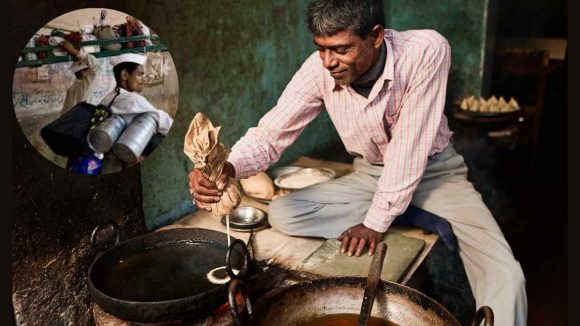The smell of fried street food billows out of every corner while rays of sunlight set over the dusty open spaces of busy western India. Street food is all about convenience—eating good food without having to wait. But for the micro-entrepreneurs competing with hundreds of sellers, it’s all about timing, setting up, and delivering satisfying dishes in record time.
For these micro-entrepreneurs, cutting down on the time spent preparing the food can be a real deal-breaker. Street food is gaining traction globally, with nearly half of consumers showing interest, according to a report by Datassential.
Locate2u sat down with Aditya Dave, the founder and CEO of Cibos in India, to find out how his business is shifting the way micro-entrepreneurs think about sustainable cooking and last-mile delivery.
Cibos works with three different sectors
Green cooking and cooking on the go are two concepts that Cibos is spearheading to change the traditional fast food sector and last-mile delivery, especially for street food vendors. Empowering small-scale businesses and micro-entrepreneurs, the business tries to make green cooking more affordable and accessible.
“You can actually practice green cooking in its true sense,” says Dave. “You can directly use solar (energy) to cook (sic).”
Accelerate green cooking with Cibos
- Fully foldable street kiosks for retail and other entrepreneurs: Street kiosks can be used anywhere, even in front of a two-wheel bicycle. You open them up, and they’re ready to be used.
- Battery-operated heating and cooling devices: The patented system is currently being used by restaurants that need to keep food cold or hot during last-mile delivery.
- Cooking on the go: Cibos is currently finalizing a plan to make it easier for restaurants to cook in their mini kiosks while driving to the customer to deliver their order.
What is ‘cooking on the go?’
Placing the raw pizza in the oven while the vehicle moves saves time. When it reaches the customer, it’s cooked and still warm. “That’s something we are experimenting with now.”
The technology has the capacity to keep food warm for up to five hours.
Green cooking for sustainability
Cibos is trying to make it “easily affordable” to use its products, enabling the ordinary street vendor or popular restaurant to be more sustainable.
Dave says anyone who can afford a hot plate can easily afford their products. Many people in India use gas cylinders for cooking.
An average household uses 30 gas cylinders per year, which one only needs when using Cibos’ products. This is cheaper, saves the entrepreneur money, and reduces the carbon footprint.
Sustainability should not be ‘fancy’
Dave says one of the biggest concerns in this sector is the affordability of going green. When it’s more affordable to implement sustainable options, more people will buy in.
Cibos aims to make it more affordable and less ‘fancy’ to do the right thing and save the planet.
“We believe in the principle that sustainability is not fancy or sexy. It is basically functional. It’s not fancy for us. It is functional, and it is basic,” explains Dave.
NOW READ: Sustainability trends 2024: From greenwashing to transparency
About the author
Mia is a multi-award-winning journalist. She has more than 14 years of experience in mainstream media. She's covered many historic moments that happened in Africa and internationally. She has a strong focus on human interest stories, to bring her readers and viewers closer to the topics at hand.











